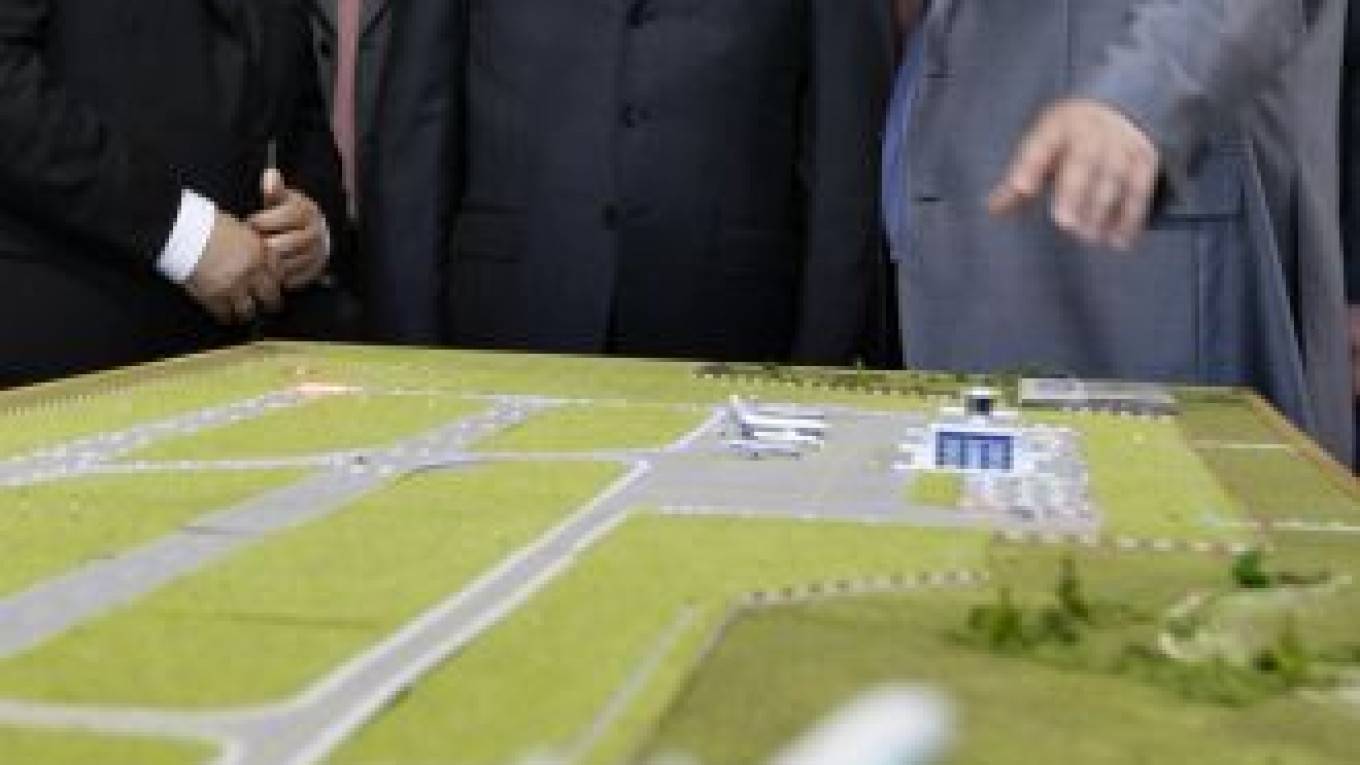Prime Minister Vladimir Putin said Wednesday that the aviation sector needed more public-private partnerships to revamp the nation's airports, which must be able to accommodate Russia's "booming" air traffic.
The state has spent 47 billion rubles ($1.5 billion) over the past two years to modernize its airports, Putin said during a meeting at an airport in the Stavropol region town of Mineralniye Vody.
"We must involve businesses in the development of airports more actively.? There have already been successful examples of such partnerships," Putin said, citing the redevelopment of St. Petersburg's Pulkovo Airport.
As part of the federal targeted program to develop ground and air transportation infrastructure, the state plans to spend more than 306 billion rubles, or nearly $10 billion, over the next five years.
After investment dried up in the 1990s, airports, railroads and the country's notorious roads fell into deep disrepair, prompting then-Economic Development and Trade Minister German Gref in 2007 to promise $1 trillion of infrastructure spending over the next decade.
But after the crisis hit in the fall of 2008, fulfilling the promise seemed a gargantuan task.
"The state, too, is limited in its financial abilities. It cannot, like a magician, pull money out of a hat," said Dmitry Baranov, an infrastructure analyst at Finam.
"This is where investors come into play. If the government can ensure a smooth return on investments over the course of five to 10 years, investors will come," he said.
The infrastructure problem came into sharp focus last week as construction work on a crumbling bridge on the route to Moscow's Sheremetyevo Airport left traffic backed up for hours.
Deputy Prime Minister Sergei Ivanov, whom Putin ordered to resolve the issue, reported that traffic was moving more smoothly after he got City Hall to open another two lanes and ban commercial truckers from the route.
"It's good the Moscow government reacted so quickly," Putin said.
City Hall was widely criticized for letting traffic snarl for four days before Putin intervened.
Putin made it clear that he wanted the number of public-private partnerships to grow, although he did not elaborate on how the government might attract new investors.
"Our goal is to turn aviation infrastructure into a prospective and attractive platform for investment [and] to establish precise and understandable rules of conduct," Putin said.
But even Pulkovo, Russia's fourth-busiest airport, hit a few bumps on its road to success.
The new Pulkovo terminal, which had a groundbreaking ceremony June 26, is slated to open by the end of 2013, doubling the airport's annual passenger capacity to 14 million people, VTB president Andrei Kostin said at the meeting. ?
The state-run bank is acting as financial adviser to the consortium Northern Capital Gateway, which last year won a concession to rebuild the airport and run it for 30 years.
VTB's investment bank, VTB Capital, holds 57.5 percent in the project, while Germany's Fragport has 35.5 percent and Greece's Copelouzos Group holds 7 percent.
Kostin said licensing headaches related to the law on foreign investment in strategic sectors had prevented the group from getting a foreign loan it needs to build.
"The Federal Transportation Inspection Service denied us a license based on the absence of a decision from the government commission on foreign investment, which you head," he told Putin.
The banker argued that the consortium should be exempt from the law because it received the airport as a concession, not property.
The development, which will cost about 1.2 billion euros ($1.5 billion), includes 440 million euros from shareholders and a planned 800 million euro, 15-year loan, Kostin said.
"This is probably the first example when it was possible to raise the money not from [state banks] VTB, Sberbank and VEB, but from foreign investors," he said.
Putin also said passenger volumes had passed their 2008 peak after recovering from a crisis-related plunge.
"Passenger volumes rose 32.3 percent in January to May 2010, compared with the same period last year," he said.
A Message from The Moscow Times:
Dear readers,
We are facing unprecedented challenges. Russia's Prosecutor General's Office has designated The Moscow Times as an "undesirable" organization, criminalizing our work and putting our staff at risk of prosecution. This follows our earlier unjust labeling as a "foreign agent."
These actions are direct attempts to silence independent journalism in Russia. The authorities claim our work "discredits the decisions of the Russian leadership." We see things differently: we strive to provide accurate, unbiased reporting on Russia.
We, the journalists of The Moscow Times, refuse to be silenced. But to continue our work, we need your help.
Your support, no matter how small, makes a world of difference. If you can, please support us monthly starting from just $2. It's quick to set up, and every contribution makes a significant impact.
By supporting The Moscow Times, you're defending open, independent journalism in the face of repression. Thank you for standing with us.
Remind me later.


